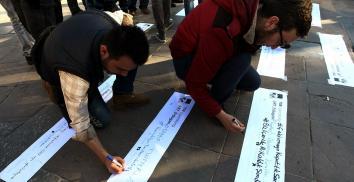Turkish Prime Minister Recep Tayyip Erdoğan declared at a rally recently that he would “eradicate” Twitter. But despite a court order that imposed a countrywide ban on the service, the tweets keep coming.
The microblogging platform has been an almost comical irritation for the embattled prime minister, who is facing allegations of corruption even as he campaigns for re-election. He’s called Twitter a “menace to society” during the country’s recent unrest.
Unfortunately for Erdogan, Turkish citizens are craftier than he gives them credit for. According to Mashable, more than 1.2 million tweets have been sent from within Turkey since Twitter went dark around midnight on Thursday. Perhaps learning from the Egyptian Internet blackout of 2011, Turks were prepared for the ban and quickly utilized a variety of methods to access the service. In the early hours of the morning, the names of several trusted virtual private network services, which provide proxy connections from other countries, began trending on various social media channels (including, yes, Twitter). One VPN provider, TunnelBear, announced that it had to add server capacity and divert its network resources to help manage the enormous load coming from Turkey. Twitter also reminded Turks that they can tweet over SMS by texting “START” to certain numbers, depending on their wireless carrier.
Even without VPNs or cellphones, Turkish citizens are apparently having no trouble simply changing their DNS settings—the controls that tell your computer how to interact with the Internet’s addressing system—to circumvent the ban. Zeynep Tufekci, a professor of sociology at University of North Carolina, sent me a screenshot of the easy DNS workaround being utilized by her contacts within the country, most of whom reappeared in her Twitter feed within hours after the blackout. And in what seems like something ripped from a cyberpunk novella, photos on social media show that people are spray-painting buildings, bank notes, and billboards of the ruling party with Google’s public DNS addresses (8.8.8.8 and 8.8.4.4). You know, just in case you missed it elsewhere.
The botched ban has come at a tense time for Internet freedom in Turkey.Twitter was blocked by a court order under draconian legislation passed in February which gives the Turkish Telecommunications Directorate the ability to block websites purely on their say-so, and also requires service providers to retain all users’ Web histories and make them available to authorities without any questions or judicial processes. Turkey’s president, Abdullah Gul, has been at odds with Erdoğan over these new practices, and even he has been seen circumventing the Twitter ban. “Such a wholesale ban of social media cannot be accepted,” he tweeted.
Erdoğan claimed on Thursday that blocking Twitter would let the rest of the world “witness the power of the Turkish Republic.” With so many simple and creative circumventions, it seems the Turkish government’s cartoonish overreaction has acted instead as a display of its own technical incompetence. But by all means, dictators—please continue to try and stem the flow of social media! After all, if authoritarians keep underestimating their subjects’ tech savvy, it makes the jobs of those trying to depose them so much easier.
